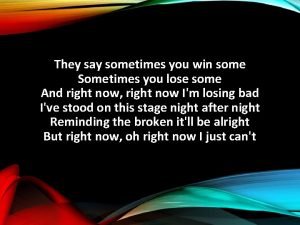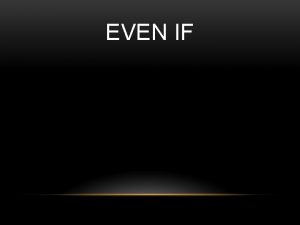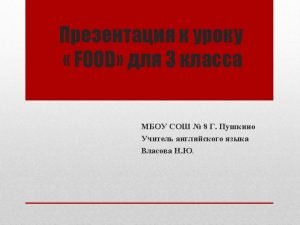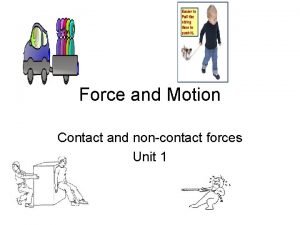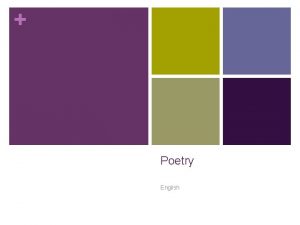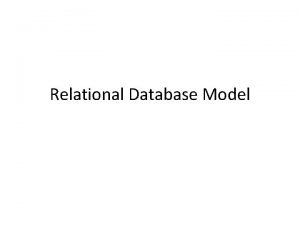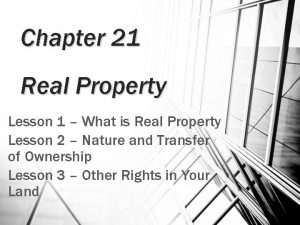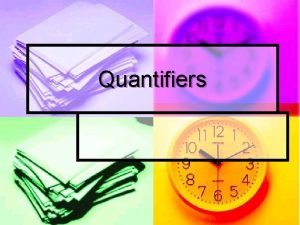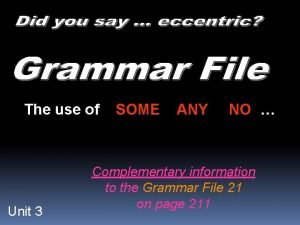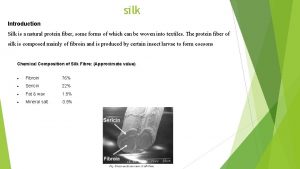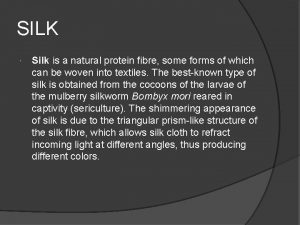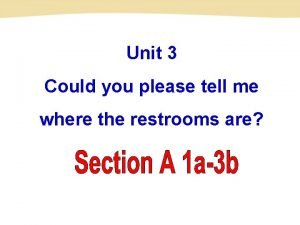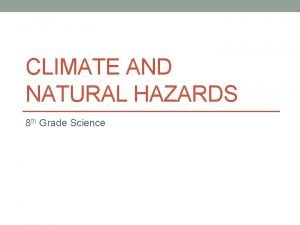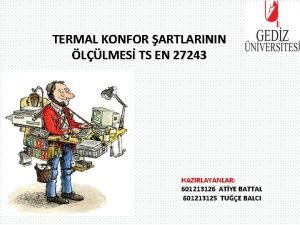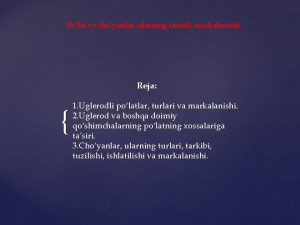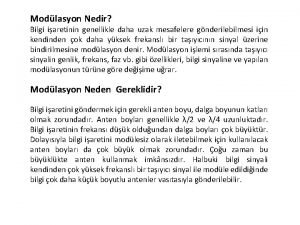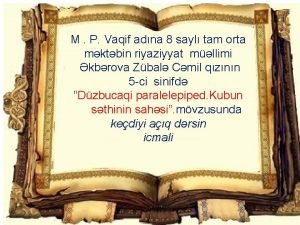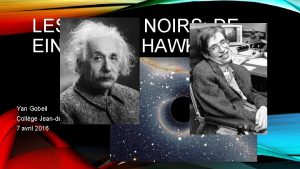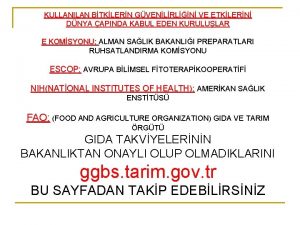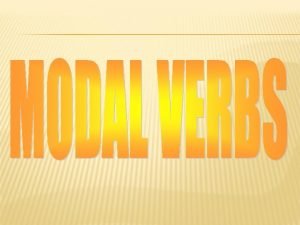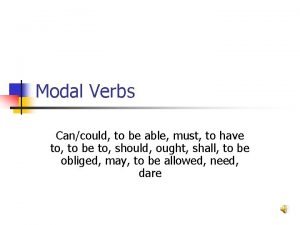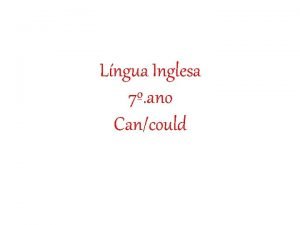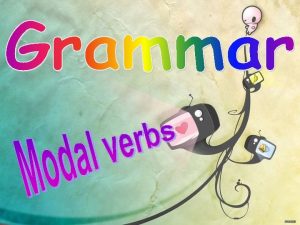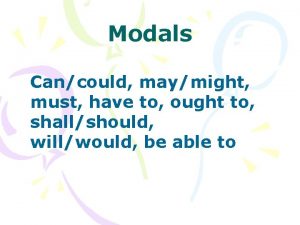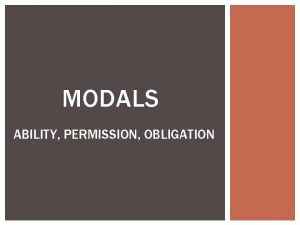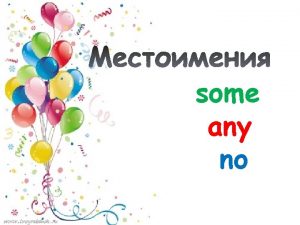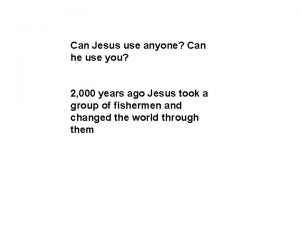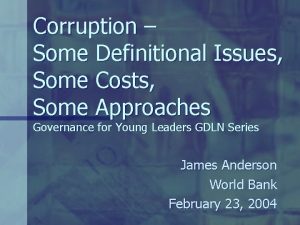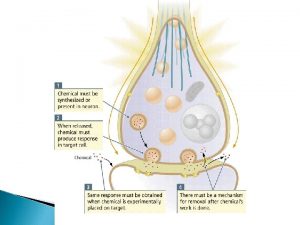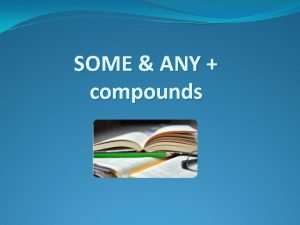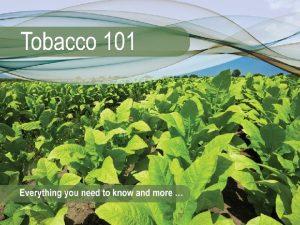Yan 1 cancould Some of us can use























- Slides: 23

Yan


1. can和could Some of us can use the computer now, but we couldn’t last year. 表示“能力” It will be sunny in the daytime, but it could rain later on this evening. 表示“客观可能性” -----Can I go now? -----Yes, you can. 表示“请求和允许” Could you wait a few days for the money? 表示“请求”, 口语中代替can, 使语气更委婉, 主要用于疑 问句, 答语用can. ----Could I use your bike tomorrow? you can No, ________. I’m afraid not Yes, ____. 表示“惊异, 怀疑, 不相信的 Can this news be true? 态度(主要用于否定句, 疑 How can you be so foolish? 问句和感叹句中)”

一 can的惯用语 1. Cannot help/choose but do sth不得不,只能 e. g. I cannot help but tell her the truth. 2. Cannot help doing sth 忍不住做某事 e. g. I cannot help laughing. 3. Cannot/never…too无论怎样…也不为过,越…越好 e. g. You cannot be too careful when crossing the street. I cannot thank you too much for your kindness, I owe my progress to you.

2. May 和Might May I watch TV after supper? 禁止, 阻止 允许, 许可 You mustn’t you may Yes, _________. / No, ____________. Might I use your telephone? May I go home now? It may be true. She may comes tomorrow. He might have some fever. May you succeed! Might比May的语气更委婉 表示可能性的推测(肯定句 中), 译为“大概, 可能”用 might时显得更加不肯定 用于祈使句表示祝愿 May you have many more days as happy as this one!

2. may 和can A • A computer _______ think for itself; it must be told what to do. • A. can’t B. couldn’t C. may not D. might not 不可能 may not_____ • 可能不 • Cannot______ may/might as well “最好”,用于提出建议 你最好把那封信给他。 You may as well give him the letter. 你今晚最好呆在家里。 You might as well stay at home tonight.

• 3. shall与should • --Excuse me, but I want to use your computer to type a report. • --You ____ have my computer if you don’t take care of it. • A. shan’t B. might not C. needn’t D. shouldn’t • Shall 可表“警告、威胁、许诺、决心”等 • Why should he think that? • Should 表“劝告、建议”, 译为“应当”;有时也 表“预测”、“可能”或表示说话人的惊奇、愤怒、 失望等感情。

Shall we begin our lessons? 用于第一, 三人称陈 Shall the driver wait? 述句中表 Shall he come in? — Come in, please. 征求对方 When shall my father be able to leave hospital? 意见或请 示 You shall go with me? You shall have the book when I finished it. He shall be punished. You shall be punished if you insist on doing it this way. 用于第二, 三人称表命令,警 告, 允诺或威胁

3 should. We should be strict with ourselves. You should keep your promise. 表劝告和建 议,“应该” They should have arrived by two o’clock. 表推测, “可能, 应该” I should help him because he is in trouble. He should do some work, but he doesn’t want to. 表义务, “应该做” It’s a pity that you should be so careless. I find it quite astonishing that he should be so rude to you. 表惊讶、惋惜, “竟然会”

1. Must表示人的主观看法,主观上必须 have to强调客观需要。 e. g. The play is not interesting, I really must go now. ______ had to work. when I was your age, I ______ 2. mustn’t 表示禁止,“不准”、“不允许” don’t have to“不必” You mustn’t go. 你决不可去。 You don’t have to go. 你不必去。

1. Must表示“必须”,其否定为“不必”( needn’t do sth & don’t have to do sth e. g. we must get up at six tomorrow. we needn’t/ don’t have to get up at six tomorrow. 2. Must表示“强制或义务”,其否定为mustn’t ,表示禁止 e. g. You must park your car here. You mustn’t park you car here.

3. Must表示“偏要,硬要“ If you must smoke, at least you should go to the smoking area. 4. must表示有把握的猜测时,有3种形式: must do sth ----对现在的猜测 must have done sth ----对过去的猜测 must be doing sth ----对现在正在进行中的事的推测。 e. g. (1)I failed the exam. You must think I am stupid! (2)You must have met him yesterday. (3)You look happy. You must be having a good time.

5. must表示猜测时,其否定有两种,将must be改为cannot be ,将must have done改 为cannot have done. e. g. (1)It must be eleven o’clock now. It can’t be eleven o’clock now. (2)You must have met him before. You can’t have met him before.

6. 回答以must提问的句子,可以用以下形式: Must we clean all the rooms? Yes, you must. No, you don’t have to. No, you needn’t. 7. 表猜测语气的反意疑问句的构成 aren’t you 1). You must be tired, _____? haven’t you 2). You must have seen the film, ______? didn’t you 3). He must have met her yesterday, ______ needn’t you 4). You must go home right now, ______?

Will & would 1. Will可表示意志、愿望和决心。 e. g. I will never do that again. I will do all I can to help you. 2. Would可表示过去反复发生的动作。 e. g. During the vacation he would visit me every week. The wound would not heal.


1. 在一般 疑问句中. May/ Might I use you rubber? mustn’t. (You are not allowed ) No, _______________ Yes , you ____. can 2. 注意: Must I go now ? needn’t/ don’t have to must. No, you__________ Yes, you______ You must work hard next time , ______? mustn’t you You must go home right now, _______? needn’t you You mustn’t walk on the grass, _______? must you

情态动词典型例题专练 1. ---There were already five people in the car but they managed to take me as well. ---It ____a comfortable journey. ( ) A. can't be B. mustn't have been C. shouldn't be D. couldn't have been 2. Johnny, you ______play with the knife, you ____hurt yourself. ( ) A. won't ; can't B. mustn't ; may C. shouldn't ; must D. can't ; wouldn't

3. The fire spread through the hotel very quickly but everyone ___ get out. ( ) A. had to B. would C. could D. was able to 4. ---When can I come for the photos ? I need them tomorrow afternoon. ---They _____be ready by 12 : 00. ( ) A. can B. should C. might D. need 5. With so much work on hand, you ____to see the game last night. ( ) A. mustn’t go B. could have gone C. shouldn’t go D. shouldn’t have gone

6. They are disappointed at the English party. They say that it ___better organized. ( ) A. had been B. had to be C. must have been D. could have been 7. She must have forgotten about the class _______? ( ) A. doesn’t she B. mustn’t she C. hasn’t she D. won’ t she 8. See who’s there ! ______ it be Mary ? A. May B. Must C. Can D. will

9. Jenny ____with him at that time, for I was having dinner with her in my home. ( ) A. can’t have been B. must be C. mustn’t have been D. may be 10. Tom’s father promised, “You ___have a new computer if you pass the coming examination, ” ( ) A. can B. should C. shall D. may

11. --- Did you walk home by yourself last night ? --- Yes, I did. But I think I _____. A. needn’t B. shouldn’t C. may not have D. needn’t have 12. ---Would you change this bucket for another ? It ______ hold water. --- OK. I’m really sorry. A. won’t B. can’t C. didn’t D. doesn’t

13. You ought to have helped him with his English, ____ you ? A. won’t you B. ought not you C. shouldn’t you D. wouldn’t you 14. --- I thought I ____something burning. ---Really ? A. smelled B. was smelling C. could smell D. might smell 15. She _____out alone at night. A. dare not to go B. dares not go C. doesn’t dare to go D. doesn’t dares go
 They say it only takes a little faith
They say it only takes a little faith Sometimes you win some sometimes you lose some
Sometimes you win some sometimes you lose some Ice cream is a countable or uncountable noun
Ice cream is a countable or uncountable noun Contact vs noncontact forces
Contact vs noncontact forces Fire and ice diamante poem
Fire and ice diamante poem Some say the world will end in fire some say in ice
Some say the world will end in fire some say in ice Some trust in horses
Some trust in horses The logical view of a database
The logical view of a database Irrevocable rights to some limited use of another's land
Irrevocable rights to some limited use of another's land We use some
We use some Fill the gaps with a/an/some/any/is/are/much/many
Fill the gaps with a/an/some/any/is/are/much/many Silk is a natural protein fiber
Silk is a natural protein fiber Which natural polymer comes from a cocoon? rubber wool silk
Which natural polymer comes from a cocoon? rubber wool silk Could you tell me where is the bookstore
Could you tell me where is the bookstore Explain how some hail can become baseball sized
Explain how some hail can become baseball sized Yan oi tong tin ka ping primary school
Yan oi tong tin ka ping primary school Termal konforu etkileyen faktörler
Termal konforu etkileyen faktörler Po'latlar turlari
Po'latlar turlari Pfizer organization chart
Pfizer organization chart Taşıyıcısı bastırılmış çift yan bant modülasyonu
Taşıyıcısı bastırılmış çift yan bant modülasyonu Kubun tilləri
Kubun tilləri Yan gobeil
Yan gobeil Hui yin
Hui yin Ersağ cüce palmiye yan etkileri
Ersağ cüce palmiye yan etkileri
